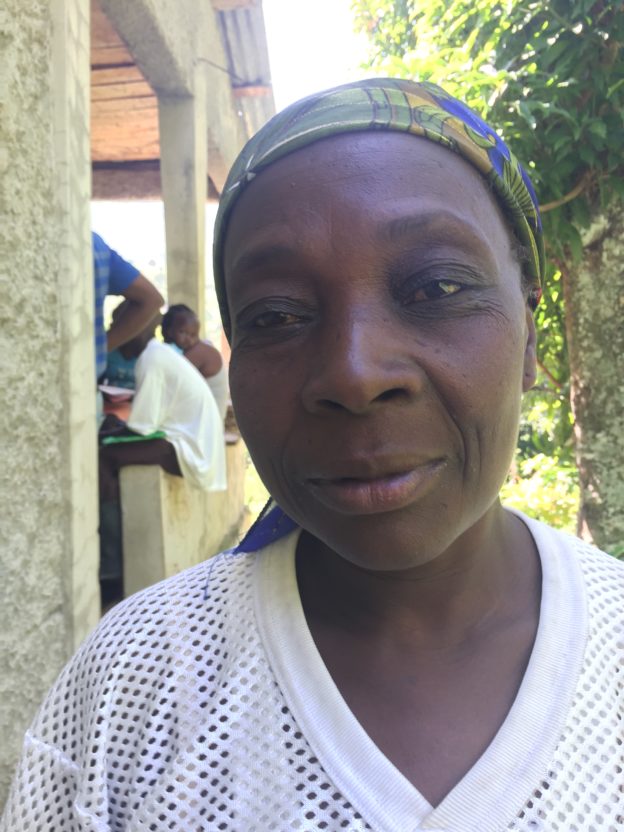Idalia hasn’t been feeling well. She says she’s had a cold and a fever. She’s been coughing a lot, too. She went to the Hospital in Mirebalais to see a doctor, but did not plan her visit through our CLM nurse, and she was not able to get herself seen. The hospital sees many more people every day than it was designed to serve, and getting to see a doctor can be complicated.
It might be simpler for her if she went to the clinic in Lakolin. It too is part of the Partners in Health network, and though it lacks the range of specialists that the Mirebalais facility’s role as a teaching hospital gives it, the lines can be much shorter and the procedures simpler. But Idalia prefers Mirebalais. Her oldest son lives there, and one of her younger ones spends most of his time at his brother’s house. Going to Mirebalais gives her a chance to see them.
And now she has an exciting new reason to do so. Her daughter-in-law just gave birth to Idalia’s first grandchild. Idalia used the occasion to spend some time with the younger couple, helping out.
She and her husband are nearly finished with their small home. They need one more palm tree, though, for a last section of one of the walls and a few finished touches. And Idalia’s not sure how they’re going to buy it. She doesn’t see where the money is going to come from, so she’s planning to talk with her case manager, Titon. She hopes he’ll have some ideas.
Building her house has been a struggle. She and her husband haven’t had a lot they can invest in the project. And it’s been hard to make progress even though hers is smaller than those being built by other members. Its only full-time inhabitants are Idalia, her husband, and their youngest son, and they decided to construct only one small room. The couple doesn’t want to remain in Gwo Labou, and they see no reason to invest too much in a house there.
They moved there a couple of years ago from Jinpaye, an area of Cornillon farther into the hills above Gwo Labou. They fled Jinpaye, where they have some land and some roots, to escape accusations of theft made against her husband. He was brought up before local leaders there, accused of stealing plantains from someone’s field, and her intervention at the improvised trail only made things worse. “A wife doesn’t speak for her husband,” she was told.
But she’s not at home in Gwo Labou. The couple found a member of the CLM Village Assistance Committee willing to let her build her CLM home on a corner of his land, but she’s embarrassed by her dependence on a stranger’s goodwill. And she feels as though her situation gives her an especially low status in the community, which affects her ability to progress.
“Yon moun vini mwen ye. Mwen rèt sou tè moun,” she explains. That means, “I’m a stranger. I live on someone else’s land,” and it’s her explanation for a range of complaints, including her sense that her neighbors don’t worry about paying her money they owe her. She’s sold both goat meat and pork, but the only money she’s received out of what she is owed is what Titon has collected for her.
She has three goats, but they haven’t been productive. One is pregnant, and a second may be. It was just recently together with a buck. But the third has been with her the longest, and it’s not gotten pregnant yet. It is probably past time for her to sell it and buy a replacement.
Idalia says that she’s not going to graduate from the program. She says that others have told her that she can’t graduate without poultry, and all the chickens that she has purchased die soon after so brings them home. She just spent 600 gourds, or almost $10, to buy six young ones, but they didn’t last.
She doesn’t really have to own poultry to graduate. That is her misperception. Many CLM families have graduated without owning poultry. But we do insist that members develop at least two income-generating activities, and Idalia has only one, the goats, so far.
